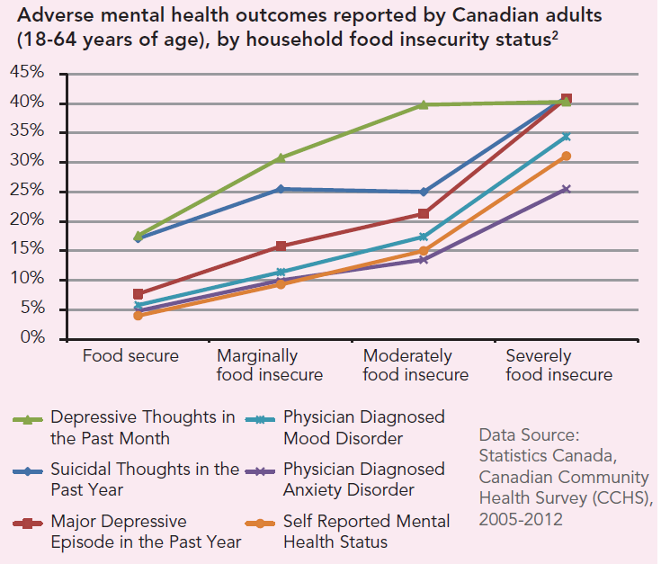Health Canada defines food insecurity as “the inability to acquire or consume an adequate diet quality or sufficient quantity of food in socially acceptable ways, or the uncertainty that one will be able to do so.” In 2017-2018, household food insecurity in Canada affected 8.8% of homes. Due to the impact of COVID-19, this number increased to 14.6% of homes in 2020 (Health Canada).
Household food insecurity is closely linked with mental health. The more food insecure someone is, the more likely they are to have negative mental health outcomes including depression, suicidal thoughts, mood disorders, and lowered reporting of personal mental health.

One can certainly imagine how uncertainty regarding where the next meal will come from (waiting till money comes in to shop again) can have a negative impact on mental health. This is further compounded by the fact that nutrition is the foundation of resilience. If the body isn’t receiving all the nutrients it needs to function optimally, it saves nutrients for critical function (like surviving stressful day to day activities) versus using them for optimal brain function, like concentration, mood regulation, etc.
In the Bow Valley we are fortunate to have a variety of organizations working hard to combat food insecurity and increase access to more nutritious food. Banff Food Rescue saves food from the landfill and connects it with individuals who need it. Food and Friends offers weekly ‘grab and go’ meals on Monday nights in Canmore at St Michael’s Anglican Church between 5-7pm. The Primary Care Network supports the coordination of the Good Food Box, a monthly affordable box of produce accessible to anyone (regardless of household food security status). The Bow Valley Food Alliance’s Food Support page has an extensive list of organizations and people offering food support services throughout the Bow Valley. And the Calgary Foothills PCN has compiled some quick money-saving ideas to make your grocery shopping more affordable.
In addition to food supports, there are a variety of mental health supports available in our community as well. Alberta Health Services offers free 1:1 counselling services as well as walk-in counselling at both the Banff and Canmore Hospitals from 2-9pm daily. For a more detailed list of mental health resources, check out this page or visit seethesigns.ca.
Addressing food security is critical to ensure improved mental health for Canadians. Our country has recently launched its first-ever nation-wide Food Policy. This is a great first step in acknowledging that our food system is complex and requires a systems-based approach to address root issues and hopefully bring about long-lasting change for Canadians so that household food insecurity rates decrease, and individual’s mental health can improve.
While we wait, and work, for our food system to shift, perhaps today you can do something simple to improve your mental health: taking deep breaths, walking in the forest, cuddling your pet, connecting with a friend. And maybe, you can up your veggie or fruit intake to give your brain a little extra nutrient boost as well.
Zarifa Monson is a Registered Dietitian with the Bow Valley Primary Care Network